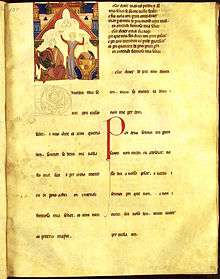Cancioneiro da Ajuda

The Cancioneiro da Ajuda (Portuguese: [kɐ̃sjuˈnɐjɾu ðaˈʒuðɐ], Galician: [kaŋθjoˈnejɾo ð(a) aˈʃuða], "Ajuda Songbook") is a collection of Galician-Portuguese lyric poems probably dating from the last quarter of the 13th century. It is the oldest of the Galician-Portuguese cancioneiros with secular music.
The Cancioneiro is kept in the library of the Ajuda National Palace, a former royal residence located in Lisbon. It consists of a parchment codex written in Gothic script by three hands and containing illuminated miniatures. Both the text and the miniatures remained unfinished and not a note of music was written in the space left for it. The whole codex contains 310 poems, nearly all of them cantigas de amor (male-voiced love songs, though a few are satiric and there are a few male/female dialogs).
The first (crude) edition dates from 1823, but a monumental critical edition, still a standard work, was published by the German-born Romance philologist Carolina Michaëlis de Vasconcellos in 1904. An important paleographic transcription was published by American scholar Henry H. Carter in 1941.
References
- Carter, Henry H. 1941. Cancioneiro da Ajuda. A Diplomatic Edition. New York-London: Modern Language Association of America/Oxford University Press (rpt Milwood, N.J.: Klaus Reprint Co., 1975; rpt [with an introduction by Maria Ana Ramos] Lisbon: Imprensa Nacional-Casa de Moeda, 2007).
- Lanciani, Giulia and Giuseppe Tavani (edd.). 1993. Dicionário da Literatura Medieval Galega e Portuguesa. Lisbon: Caminho.
- Michaëlis de Vasconcellos, Carolina. 1904. Cancioneiro da Ajuda. Edição critica e commentada. 2 vols. Halle a.S., Max Niemeyer (rpt com “Glossário” [=Michaëlis 1920], Lisboa: Imprensa Nacional - Casa de Moeda, 1990).
- Michaëlis de Vasconcellos, Carolina. 1920. “Glossário do Cancioneiro da Ajuda”. Revista Lusitana 23: 1-95.
- Ramos, M. A. et al.. 1994. Fragmento do Nobiliario do Conde Dom Pedro & Cancioneiro da Ajuda. Edição Fac-similada do códice existente na Biblioteca da Ajuda. Apresentação, Estudos e Índices. Lisbon: Edições Tavola Redonda.
- Ramos, Maria Ana, and António Resende de Oliveira. “Cancioneiro da Ajuda”, in Lanciani and Tavani 1993: 115-118.
External links
| Wikimedia Commons has media related to Cancioneiro da Ajuda. |